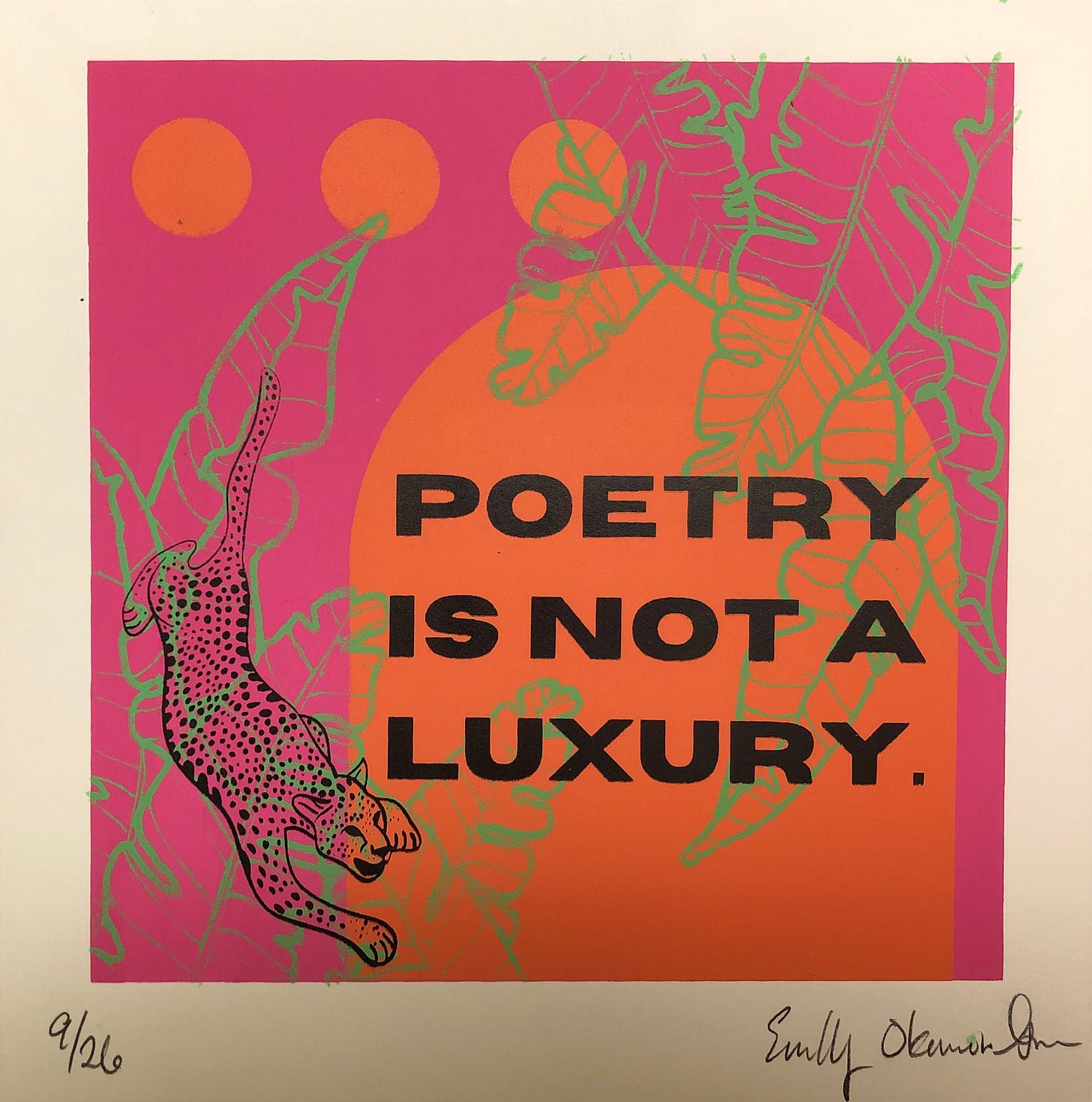
Poetry is not only dream or vision, it is the skeleton architecture of our lives.
- Audre Lorde
It’s the last few days of National Poetry Month, and I’d be remiss to let April go by without writing on the topic.
I have a vivid memory from when contemporary poet and now-novelist Kaveh Akbar (his debut novel out this year has gotten great reviews; while I can’t vouch for it yet – it’s on my summer reading list – I can vouch for him) spoke to my MFA program at Alabama. As usual, with crises occurring around the nation and world and the horrific events seemingly more urgent and terrible under Trump’s presidency, I was grappling with some guilt for spending three years studying writing. Wouldn’t direct action be a quicker way to make change? Isn’t it my duty to do whatever would be most impactful?
Of course, we have the example of writers like Rachel Carson, whose words were a catalyst for huge and hugely impactful policy changes. But the poems I write at my bedroom desk about morning light and walks with my dog?
Yes, those too. Akbar asserted that the art of creative writing – and poetry specifically – is an act of resistance.
I knew this, but his saying it aloud, especially at that moment during the Trump administration’s attempts to censor language, was powerful. Language is everything. Words shape not only how we communicate, but how we think.
And Akbar was arguing that taking control of our language, spending hours or even days weighing the choice between ending a line with river or further or just or, was both a meaningful and necessary way of asserting agency.
I also think he was speaking to the idea that making all art is resistance to the capitalist push to worker productivity, no matter if it’s writing or dance or, hell, something like scrapbooking.
Here he is making this point in another conversation: “To write something very beautiful as a sort of inherently political act against the ugliness of fascism and against the ugliness of hopelessness—I think that’s really profound. That’s been such a directive since November 9th.”
This leads me to Audre Lorde’s phenomenal “Poetry is Not a Luxury,” which I hope you’ll read today. She begins the short essay:
The quality of light by which we scrutinize our lives has direct bearing upon the product which we live, and upon the changes which we hope to bring about through those lives. It is within this light that we form those ideas by which we pursue our magic and make it realized.
The brilliant writer and activist published this essay-as-manifesto in 1985. It speaks to women and women of color specifically, yet offers an important framework and directive to all. Poetry is not just some pastime for the privileged, it’s not some silly game with words. In fact, it is the opposite.
“Poetry is the way we help give name to the nameless so it can be thought. The farthest external horizons of our hopes and fears are cobbled by our poems, carved from the rock experiences of our daily lives.”
I love that image — for some reason I imagine a sculptor chiseling away at a giant brown rock on a beach, taking something hard and rough and washed in salt, and making it smooth and approachable.
I can’t count the number of times I have found validation in a surprising metaphor, or felt newly alive in the world through a stanza that somehow records the human experience in a way I’d never considered.
If we accept poetry as a luxury, Lorde argues, than we have lost expression, and we have lost hope.
Thank you for seeing that poetry is not a luxury. It’s a responsibility and a right. Speaking of hope, I hope in these last few days of April you find time to resist the system by reading or writing something meaningful to you. Or, something just plain fun.
And in case you need recommendations, may I suggest the indelible poem “A Litany for Survival,” by Lorde. Or if you’re up for more prose, two of her other brilliant essays: “The Transformation of Silence into Action” and “The Master’s Tools Will Never Dismantle the Master’s House.”
Happy April! May the world reveal itself both poetically and through poetry.




“I can’t count the number of times I have found validation in a surprising metaphor, or felt newly alive in the world through a stanza that somehow records the human experience in a way I’d never considered.” AHMEN!! 🥰